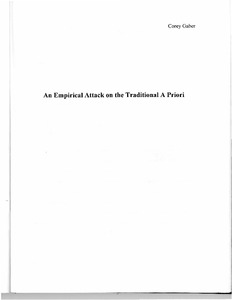| dc.rights.license | In Copyright | en_US |
| dc.creator | Gaber, Corey Brooks | |
| dc.date.accessioned | 2023-10-20T18:01:08Z | |
| dc.date.available | 2023-10-20T18:01:08Z | |
| dc.date.created | 2007 | |
| dc.identifier | WLURG038_Gaber_thesis_2007 | |
| dc.identifier.uri | https://dspace.wlu.edu/handle/11021/36488 | |
| dc.description.abstract | Does this mean we should discard the entire methodology of a priori philosophy? If a priori examination requires a propositional conception of knowledge, then I would argue yes. Conceptual analysis is not a completely futile exercise, for it does reside in the holistic picture of knowledge. However, if given the choice between exploring that tiny space vs. a much larger meaningful space, I would have to choose the latter. Perhaps what we need to continue is the motivation behind a priori philosophy. That is, finding the grounds for the possibility of something, in this case knowledge. What are the grounds for the possibility of our type of cognitive experience? First a neural network that can embody knowledge about the world's enduring structure and ephemeral here-and-now situations. Next we need an environment that provides sensory input to guide the relatively blank initial cognitive canvass. From this point a complex brain can be
constructed from sub-conceptual processes. Hebbian learning does not operate in some propositional overarching structure. It simply reinforces what the environment tells the brain. Finally to reach more advanced capabilities of knowledge amplification we need a community of cognitive creatures operating under a general cultural template. But of course the nature and function of these pre-knowledge requirements are empirical questions. One would have to abandon the notion of prior to experience. If anything the pursuit of the fundamental in terms of knowledge seems to be a rededication to the natural sciences, particularly neuroscience. [From concluding section] | en_US |
| dc.format.extent | 40 pages | en_US |
| dc.language.iso | en_US | en_US |
| dc.rights | This material is made available for use in research, teaching, and private study, pursuant to U.S. Copyright law. The user assumes full responsibility for any use of the materials, including but not limited to, infringement of copyright and publication rights of reproduced materials. Any materials used should be fully credited with the source. | en_US |
| dc.rights.uri | http://rightsstatements.org/vocab/InC/1.0/ | en_US |
| dc.title | An Empirical Attack on the Traditional A Priori | en_US |
| dc.type | Text | en_US |
| dcterms.isPartOf | WLURG038 - Student Papers | en_US |
| dc.rights.holder | Gaber, Corey Brooks | en_US |
| dc.subject.fast | A priori | en_US |
| dc.subject.fast | Philosophy of mind | en_US |
| dc.subject.fast | Knowledge, Theory of | en_US |
